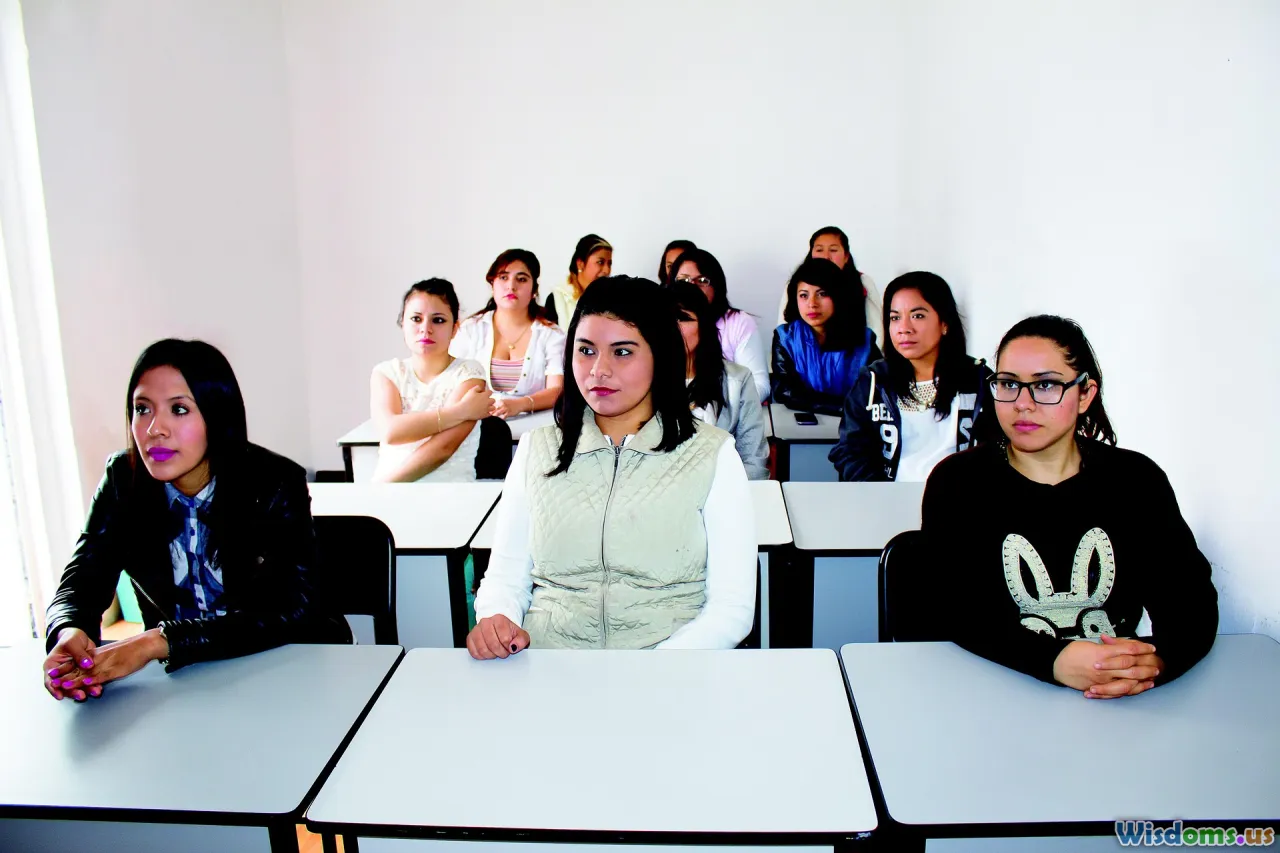
Does Remote Learning Help or Hinder Mature Students
17 min read Explore whether remote learning supports or challenges mature students pursuing further education. (0 Reviews)
Does Remote Learning Help or Hinder Mature Students?
Remote learning has transformed the educational landscape, offering flexibility, accessibility, and innovation that traditional classrooms often struggle to match. For mature students—individuals typically returning to education after years away from formal schooling—distance learning options can promise both liberation and new challenges. But can digital education truly help mature learners excel, or do hidden hurdles emerge that can set them back? Let’s unravel the complexities and see what remote learning really means for adult students today.
Understanding the Needs of Mature Students

Unlike their younger counterparts, mature students bring a unique blend of life experience, professional background, and practical motivation to their studies. Many are balancing full-time jobs, parenting, or caregiving responsibilities—their schedules are often shaped by commitments other than academia. According to the National Center for Education Statistics, about 37% of higher education students in the US are aged 25 or older, illustrating a sizable audience whose learning needs diverge from traditional models.
Recognizing the Learning Goals
Mature students typically enroll with clear, career-focused objectives. For instance, some hope to pivot into more lucrative industries; others seek personal development or the credentials needed for advancement. Their learning is purposeful and pressing, making flexibility not simply a benefit, but often a necessity.
Challenges Unique to Adults Returning to School
The very strengths that characterize mature students can also lead to specific hurdles. Self-doubt, outdated study habits, or uncertainties around new technologies add layers of complexity. Time management, already difficult amid family and work, becomes more complicated when navigating learning platforms and digital submission systems. As such, any solution—remote or in-person—must recognize these realities, not just the potential for convenient access.
The Upside: Flexibility and Accessibility

Arguably, the most touted advantage of remote learning for adult students is flexibility. Online courses eliminate the need for rigid class schedules or long commutes, allowing mature students to integrate education into their dense routines with greater ease.
Structuring Study Around Life Obligations
Imagine a single parent working a day job who wants to earn a business degree. Traditional universities might require attendance at lectures scheduled during prime working hours—almost impossible to juggle. With asynchronous online modules, the same student can view lectures or complete assignments late at night or early in the morning, when other obligations are dormant. In Charles Sturt University’s 2022 survey, over 70% of mature online learners cited ‘fit with my lifestyle’ as a crucial reason in choosing distance education programs.
Bridging Geographic and Physical Gaps
Many mature students opt for online learning because of geographic limitations or physical impairments. Rural learners no longer need to relocate for advanced education, and mobility-challenged students can participate fully from home. Institutions such as The Open University (UK) have championed remote learning for decades, with impressive graduate rates among adult students—demonstrating that access and inclusion matter deeply.
The Challenges: Motivation, Isolation, and Tech Barriers

Despite its promises, remote learning is no panacea. Mature students face significant obstacles, particularly around motivation, support, and digital literacy.
Overcoming the Motivation Slump
Self-discipline is both a necessity and a stumbling block. Unlike traditional settings where the presence of classmates and teachers provides accountability and structure, remote environments can foster procrastination and disengagement. For example, a mature learner accustomed to hands-on workplace feedback may struggle to stay on track when interaction is limited to discussion forums and periodic emails from instructors.
Research by the Pew Research Center in 2022 highlights this: about 47% of adult online students admitted finding it challenging to maintain motivation without in-person interaction. Strategies such as scheduled group check-ins, virtual study groups, and personal accountability partners have shown effectiveness in mitigating this struggle.
The Digital Divide
Technical challenges are another barrier. While office workers may feel comfortable with computers, many adults—especially those in their late 40s or older—may encounter a learning curve with educational technologies. Basic computer literacy is now essential, from submitting assignments via cloud platforms to participating in live-streamed tutorials. Support services, such as IT helpdesks and beginner tech tutorials, are crucial for minimizing exclusion.
In 2021, the UK’s Office for National Statistics revealed that nearly 20% of adults aged 55–64 still classified themselves as ‘limited’ users of digital technology, indicating a persistent digital skills gap among older cohorts.
Combatting Loneliness and Providing Support
Isolation is a recurrent concern. Classrooms enable spontaneous networking and the forging of connections—facets that online forums may inadequately replicate. Mature students, in particular, value interpersonal exchange because it brings confidence and reduces feelings of ‘otherness.’ Educational institutions that foster vibrant online communities, dedicated mentorship, and frequent interaction can make remote learning less solitary.
Blended Learning: Combining the Best of Both Worlds

Rather than positioning remote learning against traditional methods as a stark binary, more colleges and universities are experimenting with blended learning. This model combines digital coursework with periodic in-person workshops or intensive residencies—a synergy particularly beneficial for mature students.
Tangible Examples of Blended Success
Western Governors University and Arizona State University, among others, have pioneered hybrid pathways tailored for busy adult learners. For example, a nursing student might complete theoretical modules online at her own pace, then travel to campus for laboratory sessions scheduled on weekends. This hybrid structure provides both the flexibility to adjust studies around life responsibilities and the real-world networking missing from solely digital programs.
Customization and Personalization
Blended learning helps cater to individual preferences—some mature students might thrive online, while others require the reinforcement of face-to-face experiences. Universities with robust advisor programs often survey students to determine ideal mixes of online, live-streamed, and in-person modules to nurture retention and success.
Building Effective Remote Learning Strategies for Mature Students

Maximizing the remote learning experience requires intentional strategies designed around adult learners’ strengths and circumstances. Here’s how mature students and educators alike can foster productive and sustainable outcomes:
Time Management and Routine-Building
Mature learners should prioritize establishing designated study times and environments. For example, blocking daily calendar slots for coursework and setting up a consistent home workspace can help trigger an academic mindset, reducing distraction. Educational psychologist Dr. Heidi Grant Halvorson advocates for the use of "implementation intentions"—pre-planned behaviors tied to specific cues (e.g., "I will review the reading material over breakfast each morning")—to build discipline.
Leveraging Prior Experience
Older students have a wealth of experience to draw upon. Animating course discussions with real-world examples isn’t just permissible—it enhances learning for everyone. Instructors can encourage this by deliberately integrating case studies and soliciting "field stories" that connect theoretical knowledge to lived realities.
Tapping into Support Networks
Institutional supports are critical: virtual tutoring, mental health counseling, and targeted tech training can smooth the digital transition. Additionally, students should consider forming peer accountability partnerships—perhaps weekly video calls with classmates to discuss upcoming deadlines and brainstorm solutions to academic challenges.
Utilizing Technology to Build Community
Platforms like Discord, Slack, or even WhatsApp groups serve as informal gathering spots where mature students can interact outside structured learning. These networks foster camaraderie, offer troubleshooting, and make it easier to celebrate shared victories—a psychological balm against demotivation.
Employer Perceptions and Career Trajectories

A frequent concern among mature students is how online credentials are perceived by employers. Are remote degrees viewed as less credible, or do they confer different professional advantage?
Evolution of Employer Attitudes
There was a time when distance education was stigmatized, seen as less rigorous than campus-based study. However, the sharp expansion of remote work during the COVID-19 pandemic has shifted these perceptions. Surveys by Northeastern University in 2023 indicate that 62% of employers now rate online degrees as equivalent to or more valuable than traditional ones, particularly when combined with relevant work experience.
Integrating Education and Real-World Experience
Mature students often have portfolios stocked with non-academic achievements. Online learning can enhance their professional development by filling theoretical gaps or legitimizing skills through certifications. LinkedIn’s 2023 Job Seeker Survey shows that candidates who blend accredited online credentials with preexisting experience see a 23% uptick in job interview call-backs compared to those with either component alone.
Psychological Boosts and Identity Shifts

Success nurtured through remote education goes beyond professional opportunity. For mature students, returning to learning can serve as a deep personal affirmation.
Confidence and Self-Efficacy
Earning a degree or certificate later in life yields profound psychological benefits—renewed confidence, the rekindling of a sense of agency, and inspiration for family or younger colleagues. Jill, 54, a remote graduate from Southern New Hampshire University, recalls: "Completing my online MBA showed my children that personal transformation is possible at any age. The tech skills I learned have even allowed me to advance further in my job than I ever imagined."
Reimagining Oneself
This process, though invigorating, also challenges lifelong expectations. Many mature students have long held an image of themselves as non-academics or as too old for further schooling. The flexible, accessible pathway provided by remote learning upends these narratives, validating that learning is truly lifelong.
Tips for Institutions: Designing for Adult Success

Educators and administrators must adapt if they intend to serve mature students effectively in remote environments. Here are several proven strategies:
- Structured Onboarding: Develop comprehensive online orientation sessions tailored to digital newcomers, demystifying tech tools and campus resources.
- Responsive Advising: Assign academic advisors trained to guide older learners, anticipate attrition triggers, and proactively address concerns about isolation, motivation, or workload.
- Flexible Assessment: Offer a variety of evaluation methods (project-based, experiential, portfolio) to acknowledge broader life experience, rather than relying solely on timed exams.
- Accessible Support Services: Ensure all mature students can access 24/7 tech help, tutoring, wellness counseling, and opportunities for peer mentoring.
- Active Engagement Channels: Intentionally design online forums, small-group projects, or synchronous video discussions that encourage relationship-building and community cohesion.
- Recognition of Prior Learning: Create pathways that credit previous professional or volunteer achievements toward degree requirements, reducing cost and duration of study.
By investing in these areas, institutions not only enhance completion rates for adult learners but also foster a more inclusive, dynamic learning community.
Navigating the Road Ahead: Help or Hinder?

Remote learning is neither inherently a help nor a hindrance for mature students—it is a tool whose impact depends on thoughtful design, personal commitment, and institutional support. Its greatest power lies in democratizing education, expanding opportunity, and reimagining what it means to be a learner at any stage of life.
For some adult students, online education delivers freedom, flexibility, and renewed purpose. For others, the absence of in-person contact and technological barriers may create hurdles requiring extra determination or targeted intervention to overcome. The evolving education landscape acknowledges these truths, increasingly customizing approaches to unlock potential and transform lives.
As digital learning evolves, both mature learners and the institutions that serve them must continue to innovate, advocate, and adapt—ensuring every adult student has the opportunity to excel, wherever and however they choose to learn.
Rate the Post
User Reviews
Other posts in Adult Education & Lifelong Learning
Popular Posts















